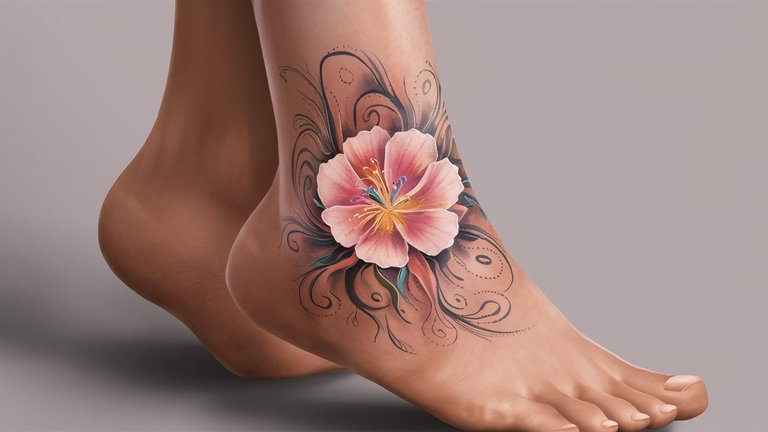Your body is your journal & your tattoos could be your story
Until recent times, body art was seen more as a woman thing, especially in Nigeria, in most cultures, females especially brides are the only ones permitted to adorn their bodies to look attractive and appealing. The male folks only shared similar body art with the female folks on tribal or cultural marks. These tribal marks are cuts on the faces of the Indigenous people to whom the marks belong and these marks stand as a form of identity distinguishing them from other tribes.

source
Body Art in Nigerian Culture
In the Northern part of Nigeria, the females of the Hausa and Fulani ethnic groups wear only a temporary tattoo called Henna or lalle, henna is a reddish-brown dye that is gotten from the powdered leaves of a shrub plant and is used to create designs or decorations on the hands and feet.
Similarly in the eastern part of Nigeria, the various marks and incisions include Uli, Egungun, Ogbanje scar, Ichi, etc, for the Igbo culture these marks are symbols of identification, beautification, spiritual or ritual purposes, festivals and celebrations, and also to distinguish the various class or status of its people.
For the western part of the country, the Yorubas use a scalpel-like knife called 'abé' to make incisions on the face and darken with local dye or burning the cuts. Like other ethnic groups, tribal marks for the Yorubas were a means of identification and beautification. These tribal marks include; owu, gombo, abaja, pele, soju, and jaja. Over time, tribal marks were outlawed, and only a few number of ethnic groups still practice the act in recent times.
Modern Tattooing
In modern times, tattooing could be made on various parts or areas of the body which includes, the wrist, behind the ear, behind the palm, neck, shoulder, upper arm, chest etcetera. Tattooing is mostly common among artists, musicians, actors/ actresses, and drug addicts. Somehow, today society frowns at tattooing as it is seen as an act of indecency and irresponsibility. Modern days tattooing just like the ancient tribal marks are means of beautification and to mark social positions that are visible and recognized by their own members.
Record-Breaking Tattoos
According to the Guinness Book of Records, "Lucky Diamond Rich, who was born in New Zealand holds the highest record for having more tattoos than anyone else in the world. After spending over 1000 hours; approximately 42 days having his body inked by hundreds of artists." The record has it that he got his first tattoo at age 16 and his second at age 18. By the time he was 28 years old, he had, had his body fully covered in colourful designs and even proceeded to cover his eyelids, webs of skin between his toes and gums in black ink.
Body Modification
Body modification that involves the deliberate act of altering the physical appearance or anatomy of the individual and is performed for a larger variety of reasons which may include, affiliation with group membership or religious beliefs (rites of initiation or passage), expression of self, aesthetics and sexual enhancement amongst other reasons.
Body modification procedures which may include, complete or partial removal of body parts, incision, insertion of foreign bodies or materials, enlargement, perforation of the earlobes, and so on. People usually undergo these procedures because they are dissatisfied with their physical appearance. Body modification may not necessarily be carried out by medical doctors but by body artists who are trained or skilled in that category.
Religious Views
Both religion, Christianity and Islam frowns at the art of tattooing or the modification of the human body by deliberately alternating the physical appearance by means of cosmetic or medical surgery. Scripturally, Christians are admonished to avoid cutting their bodies for the dead or putting tattoo marks on themselves. ( Leviticus 19:28). This law was given in order to differentiate them from others. Moral-wise, tattooing which is most common, is seen as a mark of irresponsibility and indecency in recent times.
Health & Social Consequences
Tattooing and body modification may have negative consequences on the health and social well-being of the individual, these consequences may include getting infected from unsterilized instruments or equipment used, negative bodily reactions to the foreign or introduced material or substance or body inflammation, and social stigmatization amongst other effects.
Appreciating Natural Beauty
It is important to note that the negative effects of tattooing and body modification can be disastrous and individuals involved or interested in these body arts suffer gravious consequences on their health. It is more profitable to appreciate your genetic makeup without alterations.
Citation: Lucky Diamond Rich: Most inked man on Earth
Facing writer's block? Join the lnleo May Writing Prompt today and say goodbye to, "I don't know what to do write about today".
Posted Using InLeo Alpha
Tatoo is an ancient culture that I cannot accept to have on my body 😝
😂
Thank goodness I added that it's profitable to appreciate your genetic makeup without alterations.